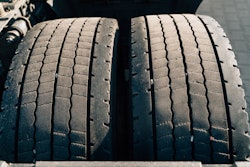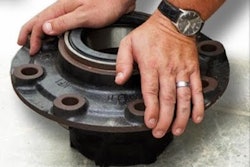Darryl Purificati, OEM technical liaison at HollyFrontier Lubricants & Specialties, which includes the Petro-Canada Lubricants brand, said incorporating a used oil analysis program into your maintenance schedule provides "insight into the health of the lubricant, contaminants within the engine and the overall engine condition."
A sample's ability to help diagnose potential engine issues can prove to be "the bigger utility of oil analysis," added Chevron Senior Staff Engineer Shawn Whitacre. "It can tell you early on about the possibility to coolant leaks, issues with air filtration, maybe even about injectors that are bleeding fuel into the crankcase or not offering good combustion and putting a bunch of soot into the oil. Once you become familiar with the broad variety of information that is offered via the oil analysis, the more you can kind of warm up to its various utilities."
Karin Haumann, OEM technical manager for Shell Global Solutions, noted small fleets can use an engine oil analysis program to monitor the condition of each of their trucks and to customize the drain interval, while larger fleets can select trucks representative of a group of trucks within the fleet that operate in similar conditions and sample their oil to establish the optimum oil drain intervals for each group.
"Optimally, you should have a sample of used oil analyzed after every oil change for every truck," Haumann said. "Closely examining the characteristics of the oil regularly can tell you a lot about both the health of the oil as well as indicate mechanical issues with an engine. This can help spot any problems with an engine early on and save on downtime and expensive repairs."
Oil analysis, Haumann said, isn't just for fleets interested in testing new oil types or seeking to change oil drain intervals. It can determine the useful life remaining in engine oil as it looks at things like oxidation and nitration, additive depletion and viscosity.
Taking on a used oil analysis program can be daunting at first to sort through the various information about the sample, "but once you get familiar with it, it can actually provide a lot of insight, and many of the oil analysis providers take that extra step and help you interpret the information," Whitacre said. "So, they provide a bit of an action plan that kind of recognizes the significance of the various readings and kind of provides a little bit of a diagnosis, even if that diagnosis is that everything's okay. If there are things that are watch points, they'll signal that."
Are you sampling engine oil? Maybe you should be. Here's why. Check out the video above.
Whitacre said that it's rare that a carrier would need to take action based on a single reading, adding that action plans are developed over a period of time as part of a trend analysis. "A lot of times, the first recommendation from the provider is to re-sample at some other fixed interval and watch to see if that trend continues because that's a confirming indicator that something is going wrong and may at that point prompt the need for preventive action."
Most oil sampling partners have streamlined the submission process, which includes pre-labeled supplies and pre-paid return labels to simplify the process for drivers or carriers who don't have a dedicated preventive maintenance technician.
"It really just becomes a matter of taking the sample, making sure there's good supporting for that sample – which includes the mileage at which it was taken, the type of oil that's used, as well as information about the unit that sample came from," Whitacre said, adding that practically any third-party maintenance provider would also have partners who could help facilitate an oil sampling program. "You'd be surprised that if you engage with them that there are likely to be avenues – that they have partnered with oil analysis providers to offer that as a bundled service in addition to the actual maintenance event itself."










